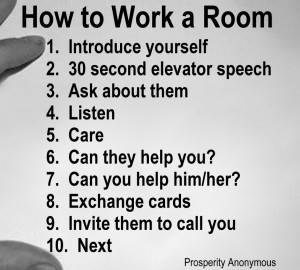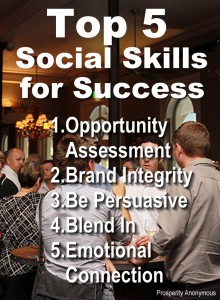Q: Where do you find individuals to model?
A: Working the room at networking and/or social events; and so should you.
Successfully working a room is a complex method that either comes naturally to you, or will take a lot of concentration and work to develop the skills necessary.
Your assignment (should you choose to accept it) is to go forth, find a venue and work the room yourself. If it’s outside of your comfort zone, then you are a true hero; not just the hero in your own story but a beacon of hope for others – who, like you – are struggling taking this critical step, too.
If you know people in this venue, do not hang out with them. Make it a priority to meet people that you don’t know, ask them who you should introduce yourself to and set your feet in motion. Consider sitting next to someone you don’t know.
Here are 10 things to help you prepare for the next phase in your journey as you develop your networking skills.
If you can, meet with the most high-ranking person that you already know at the event (a special guest, event promoter, or other friend) visit with them briefly and ask them who you should talk to next (who could most benefit from your service or help promote your service).
How to Work a Room in 10 Steps
1. Introduce yourself
2. 30 second elevator speech
3. Ask about them
4. Listen
5. Care
6. Can they help you?
7. Can you help him/her?
8. Exchange cards
9. Invite them to call you
10. Next
Avoid the person who appears to be purposely avoiding interaction with others. But acknowledge them with a friendly nod as you work the room, letting them gain their own courage (if that is what they lack) from witnessing yours.
 If you must proceed blindly simply walk up to someone who possesses a commanding presence and isn’t actively engaged in a conversation. Feel confident enough to break character for a moment and honestly say, “I expected to see someone I knew, here, but to tell you the truth, I don’t see anyone in this room that I know. What’s your name?”
If you must proceed blindly simply walk up to someone who possesses a commanding presence and isn’t actively engaged in a conversation. Feel confident enough to break character for a moment and honestly say, “I expected to see someone I knew, here, but to tell you the truth, I don’t see anyone in this room that I know. What’s your name?”
Once they’ve recognized your plight, he or she will likely be enthusiastic about introducing you to some other folks in the room to help you get started. If not, try the same approach with another person who appears to be a confident extrovert. Really, all you have to do to get the ball rolling is to
1 Introduce Yourself
Be polite, friendly, smile and say, “Hi, my name is _________ … and you are?” It really is that easy.
They may or may not ask about you, nonetheless, early on, comment on the event, their appearance, then:
2 Give your 30 second elevator speech
You have rehearsed this and can recite your 30 seconds worth without it sounding as if it was simply recited or memorized.
Never be shy discussing your business with anyone. They may not need your services, but may someone who does.
3 Ask about them
After you’ve established who you are and what you do, begin learning about the person you’re meeting. Ask exploratory questions. You’ve indulged yourself, now it is time to connect and discover more.
Have they travelled or done this before? Ask them why they are here.
Don’t ask questions that can be answered with a simple yes or no. Invite them to expound by asking who, what, when, where and how questions. When they’re answering questions, they’re doing the heavy lifting.
4 Listen
Yes, your intention is to promote yourself but you do so by listening to the person you are meeting.
Listen for clues for ways you can help them on their journey or can help you on yours.
Practice active listening. Look them in the eye (this may be uncomfortable for some, at first but it is an important component of effective communication). Make the effort to paraphrase and repeat portions of what is being expressed by the person you are meeting.
5 Care
Don’t just acknowledge the other person, but show them that you care. You can express caring about a stranger in a brief conversation by nodding or making appropriate facial expressions to mirror the emotions that they might be feeling at a deeper level as they speak.
6 Can they help?
As they are expressing themselves, be listening for ways they might be able to further your purpose.
7 Can you help?
Suggest a way that you might be able to help them, if appropriate, based on this brief exchange.
Emphasize how you can help them rather than how intellectual you are. People are interested in what you can do to help them.
People appreciate generosity and authentic offers of assistance and your help may simply take on the form of an empathetic ear and compassionate understanding of their plight.
8 Exchange cards
Do not force a card on everyone that you speak to. Offer your card only if it would be beneficial for this person to contact you later.
Remember, this is not a sales call, but if this person might see a need for your service, product or skill(s) – or if they have asked for your card – then absolutely you should give them one.
Likewise, if they have skills that you might need, either now or in the future, you should request their card.
If you get someone else’s card, write notes on it, so that you can remember who they were. Getting other people’s cards is actually more important than giving out yours… and this only works if you follow-up and invite them to participate with you.
9 Invite them to call you.
If you’ve given them a card and there is potential that you may be able to serve them in some way, make sure to invite them to call you so that you can discuss more details of the possibilities that may be uncovered in this brief interaction. Remember, this is not a sales call, nor is it a time to close. Keep it brief, because you must move on…
10 Next
Move on to the next person. If you don’t know who you should speak to next, ask the person you are wrapping up with. In most cases, you will find them eager to suggest someone that you should talk to and may even escort you to the person and introduce you.
Exiting the event
Don’t just leave. Thank the presenter, guests; re-connect with the people you’ve connected with before you make your exit.
Following the event
Follow-up. If you do not contact them again, then there will likely not be potential gain. Give them the opportunity to move through your social circles.
It’s all about building lifelong clients and friends via relationship.
Excerpt from Success Attributes © 2008 David M Masters used by permission.

